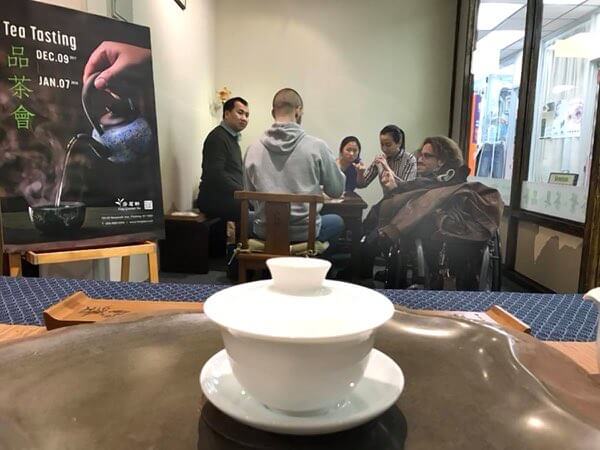By Tammy Scileppi
If you’re an avid tea drinker, you’re probably aware of tea’s calming effect and are instinctively cognizant of how different having a cup of tea vs. a cup of coffee feels.
Sipping your favorite tea can be a spiritual experience. And it’s no wonder, because there’s a kind of unity between the mighty tea leaf and Zen. That spiritual connection makes sense because tea’s back story is infused with a blend of ancient concepts, myths and legends that swirl around spirituality as well as philosophy.
The history of tea, according to Chinese legend, dates to 2737 B.C.E., when the science-loving emperor Shennong discovered the stuff after a leaf from a wild tea tree in his garden happened to fall into his pot of boiling water. After drinking the infused water, the emperor had an aha moment and started researching the mystery plant. Legend has it, this led to his discovery of tea’s medicinal properties.
It’s possible that the tea plant originated in regions around southwest China, Tibet, and Northern India. Ancient rumor has it that traders encountered people chewing tea leaves as medicine.
Gradually, everybody started sipping this new concoction during the classic age of tea, or the Tang dynasty (618-907), and eventually, it was recognized as China’s national drink.
During that period of tea enlightenment, a creative Buddhist monk imbued his writings with a spiritual aesthetic that reflected Buddhist, Taoist and Confucian religious thoughts of the time. His teachings were centered on a traditional tea ceremony, which served as a metaphor for expressing the harmony and simplicity that not only ordered but also streamed throughout the entire universe.
Fang Gourmet Tea is committed to promoting that spirit of teaism, which is believed to be a part of physical and spiritual wellness in daily life.
You’ll find this exotic gem off the beaten path at 135-25 Roosevelt Ave. in Downtown Flushing, nestled behind a mall. It’s a lovely place to visit if you wish to sample a unique selection of world-renowned exotic teas and, while you’re there, take a gander at the myriad styles of refined tea accessories and pottery. These costly items and teas are so special that finding them elsewhere in the country is nearly impossible.
At the shop’s recent yearly Tea Tasting Expo and tea enthusiasts’ reunion, local devotees and visitors from across the United States gathered to relish Fang’s wonderful and complex tea offerings — like a vintage tea from 1890, which was brought out and enjoyed by guests — as they experienced the unity of tea and Zen while sharing tea-related stories.
Visit Fang Gourmet Tea for tea classes and tea ceremony by appointment, and you too can appreciate the Tao of Tea.
According to Fang’s website: It is an art of living about brewing and drinking tea. With tea as the medium, the Tao of Tea is an etiquette of everyday living, as well as a way of life, cultivating moral character through tea. Tea can purify and clear our minds, purging distracting thoughts; it is interlinked to the Eastern philosophy of promoting “tranquility, simplicity and contentment” and is also in line with Taoism’s idea of “introspective practice.” The core of tea culture lies in the spirit of the Tao of Tea while “confluence of tea and Zen” is considered as the highest realm of it.
Did you know that Indian history attributes the discovery of tea to Prince Bodhidharma, an Indian saint who founded the Zen school of Buddhism? After leaving India in the year 520 to preach Buddhism in China, he made a vow: to meditate for nine years without sleep so as to work out various Zen principles. When he was done meditating, he finally fell asleep. Legend has it the poor saint was so distraught when he awoke, that he cut off his eyelids and threw them to the ground. Amazingly, a tea plant sprung up on the spot to sanctify his sacrifice.
Local artist Hiromi Niizeki, a native from Japan, says she drinks both coffee and tea but has been shifting to more tea recently. “I feel tea is milder for stomach than coffee. I love chai-Indian milk tea with spice which I always get in Jackson Heights. I recently purchased spice, cinnamon, ginger and cardamom at Indian market in Jackson Heights so that I can make chai at home.”
She says her immediate neighborhood, 25th Avenue and Steinway Street in Astoria, is filled with Middle Eastern shops, and she loves their spiced milk teas, as well. “Iced Thai tea is also very tasty. I also drink green tea in Japanese traditional way without sugar or milk.” She explained: “Simply brew with hot water, then slightly lower the temperature so as not to yellow the color green.”
Niizeki added: “I also sprinkle maccha (powdered green tea) over vanilla ice cream, which is my favorite. Recently, I purchased Rooibos tea for evening, with orange vanilla cream flavor … and I love it very much as well.”



































